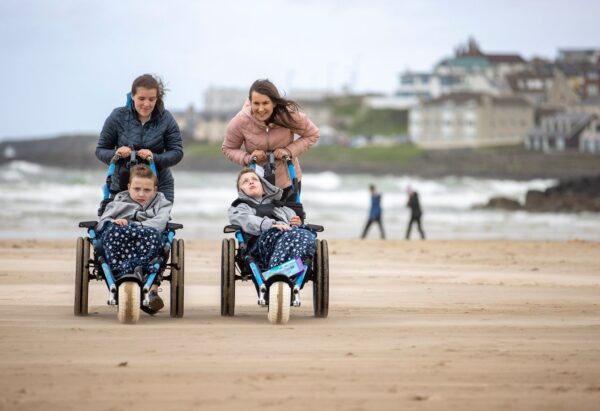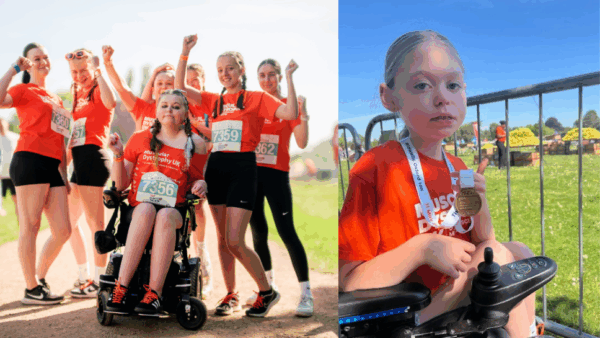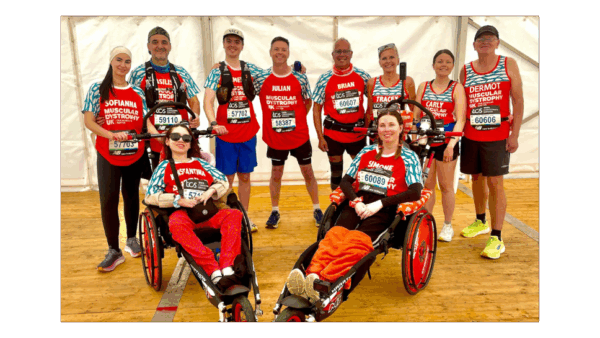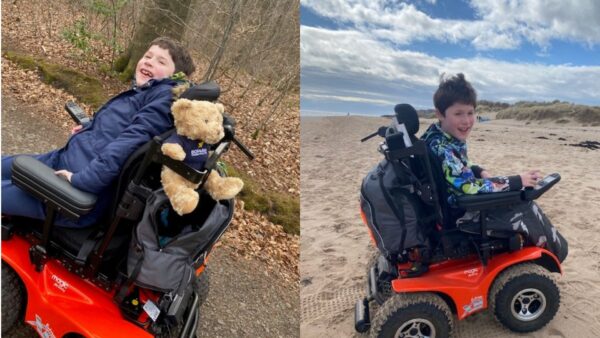Read real life stories from people in the muscle wasting and weakening community. Browse our blogs about a range of topics we think will interest you.
STORIES FROM OUR COMMUNITY
Filter by type

My role as a Myasthenia Gravis Nurse Specialist
Shelly Rodriguez is a Myasthenia Gravis Nurse Specialist at St George’s Hospital. In recognition of Myasthenia Gravis Awareness Month, she shares what led her to this role, how she supports patients, and what she’s learnt about managing the condition over the years.

‘Oh I do like to be beside the seaside’ – Sun, Sea and Accessible
As the UK heats up, the thought of a seaside visit with the sounds of lapping waves and falling sand between your toes sounds dreamy. However, for those living with a muscle wasting and weakening condition (or indeed anyone with a disability) the thought of a beach day, soon becomes a logistical nightmare.

“My two daughters and I all have FSHD, but we have very different symptoms.”
Leanne and her two daughters, Evie and Martha, have facioscapulohumeral muscular dystrophy (FSHD). On this FSHD awareness day, Leanne shares what it’s like being a parent to children who have the same condition as her, how the severity of their symptoms all differ, and the recent fundraising her teenage daughter Evie has done with her friends.

Climbing the Three Peaks in support of my son
On 17 May, James Anderson set off to start his challenge – climbing the three highest peaks in the UK within 24 hours, in support of his eight-year-old son Max who lives with Duchenne muscular dystrophy. He was joined by a few close friends and family and together they raised over £5,400. We spoke to James to find out why he took on the challenge.

Coming out every day: my intersecting journeys with LGBTQ+ and disabled identity
"Coming out." For many, the phrase makes people think of a single, life-changing event. But what if coming out is a path you navigate every single day? This Pride month, as we celebrate the courage and diversity of the LGBTQ+ community, I want to share a more personal reflection – one that explores this idea of continuous "coming out," not just as a gay man, but also as someone living with a disability.

“I have a greater perspective on life thanks to being Frankie’s Dad”
Paul’s son, Frankie, was born with muscular dystrophy and recently had his 16th birthday. In celebration of Father’s Day, Paul reflects on what fatherhood means to him, how this has evolved over the past 16 years, and what being a father to a child with a muscle wasting condition means to him.

Supporting mental wellbeing for children
Dr Chloe Geagan is a clinical psychologist, working in paediatric neuropsychology at the Great North Children’s Hospital and John Walton Muscular Dystrophy Research Centre. She has experience working with people of all ages, although most of her work is with children and teenagers. Dr Geagan particularly values working with young people with neurological conditions, neurodiversity or learning difficulties. We share some of her insights from a talk she gave at our England information days.

Living with myasthenia gravis: my 10-year journey to diagnosis
Despite having symptoms for over a decade, Sarah was only diagnosed with myasthenia gravis in 2024. Now determined to help others get earlier diagnoses and feel less alone, she’s written about her condition progression whilst not knowing what was happening to her body, how she finally received a diagnosis, and the community she’s found through the charity’s myasthenia gravis support group.

“Gaming offers a level playing field”: why we want you to be part of our streaming community on Twitch
Having recently joined the streaming community on Twitch, we caught up with Liam Quinn to hear about a gaming event we hosted in London and why online gaming is a great way to raise money, awareness and foster a community.

Meet our first London Marathon wheelchair participants
In April 2025, for the first time, our London Marathon team included two people taking part as assisted wheelchair participants after they were successful in the ballot for places. We caught up with Konstantina and Simone who completed the 2025 London Marathon, each accompanied by a team of four support runners.

“Beyond the physical: navigating the mental health challenges of muscle wasting conditions”
For Mental Health Awareness Month, we asked people in our community: ‘What aspects of your mental health do you struggle with most?’ and ‘What helps you cope on your hardest days?’

“His new all-terrain wheelchair has given our son his smile back.”
Lisa, mum to Alfie, shares how receiving an all-terrain wheelchair for Alfie through our Joseph Patrick Trust (JPT) grant has been life changing for the whole family.